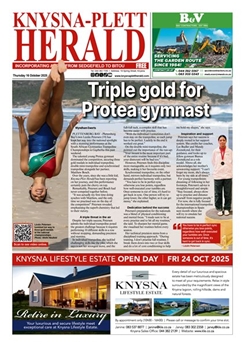PLETTENBERG BAY NEWS – While many have known for years what magic lies in Plett as a whale-watching mecca, the town has now been recognised internationally as a Whale Heritage Site.
The classification of Plett as a Whale Heritage Site (WHS) came courtesy of the World Cetacean Alliance (WCA), making it one of only three sites in South Africa.
The announcement was made in a media release by the Plett Tourism Association on Monday 29 May, and Rob Smith, chairman of Plettenberg Bay's WHS steering committee, expressed his delight.
"It is a feather in the town's cap and international recognition of how well the town does in preserving its most important and beautiful assets – our ocean and coastal areas," he said.
Contributor to local economy
Smith also emphasised the importance that this recognition will hold for the town. "Marine tourism in Plettenberg Bay is a significant contributor to the town's economy and the international linkages offered by this accreditation will benefit several sectors in the town, from tourism and hospitality businesses to conservation organisations and local marine scientists."
Plett Tourism CEO Patty Butterworth was also overjoyed with the outcome of Plett's candidacy.
"This is wonderful news for the future of our local tourism industry and travellers wishing to visit these gentle giants that visit our shores," she said.
"We understand that very few destinations have been granted this accolade and we are thrilled to stand shoulder to shoulder with these fine marine locations. This is a huge achievement for all of Plettenberg Bay and the conservation of our area."
What is the WHS initiative?
According to its website, the Whale Heritage Site initiative is a certification programme established by the WCA.
The very few sites that are deemed worthy of WHS status are seen as outstanding locations where whales, dolphins, or porpoises (cetaceans) are embraced through the cultural, economic, social and political lives of associated communities, and where people and cetaceans co-exist in an authentic and respectful way.
"WHS will be confined to those places where human relationships with cetaceans are positive and not exploitative," the website reads. "The World Cetacean Alliance believes the development of a network of WHS, designated against well-developed and robust criteria, can play an important role in distinguishing areas where cetaceans and people exist in harmony."

Plett's cetacean significance
Plettenberg Bay is situated between two Marine Protected Areas (Tsitsikamma and Robberg) and supports a wide diversity of ocean wildlife, including iconic species such as humpback whales, southern right whales, Bryde's whales, killer whales (orcas) and Indo-Pacific bottlenose dolphins.
The area, surrounded by the Tsitsikamma Mountains, Indian Ocean coastline, indigenous forests and endemic fynbos vegetation, is well known for its terrestrial and marine diversity.
The town is home to various conservation initiatives such as the annual Plett Ocean Festival, which inspires people to appreciate and preserve the precious marine system.
There are also research projects that carry out valuable conservation work year-round, including monitoring the endangered humpback dolphin population and tackling threats like the entanglement of Bryde's whales in fishing gear.
 Killer whales are well-known visitors to Plett. Photo: Sharyn Hodges
Killer whales are well-known visitors to Plett. Photo: Sharyn Hodges
‘We bring you the latest Garden Route, Hessequa, Karoo news’
















